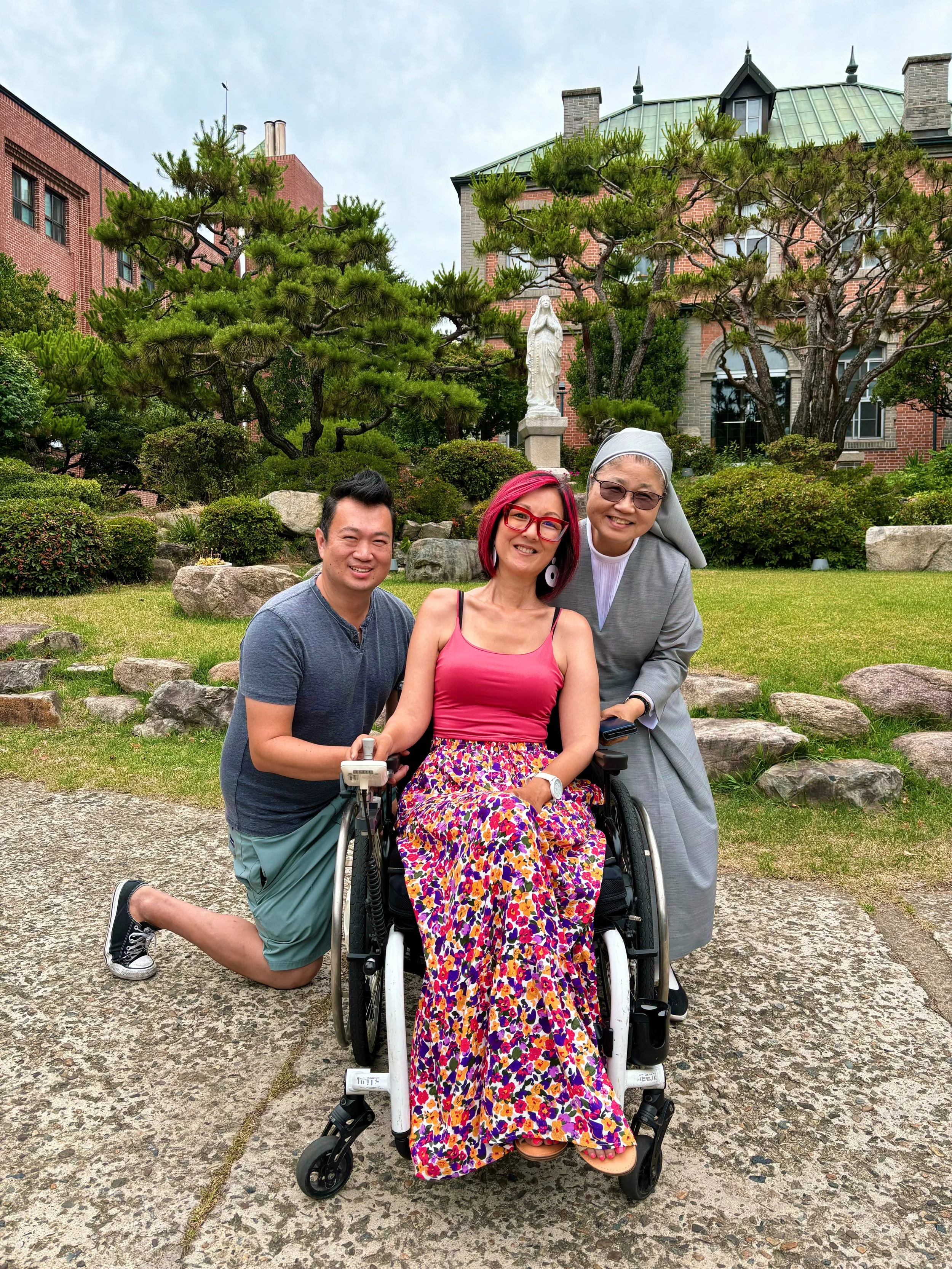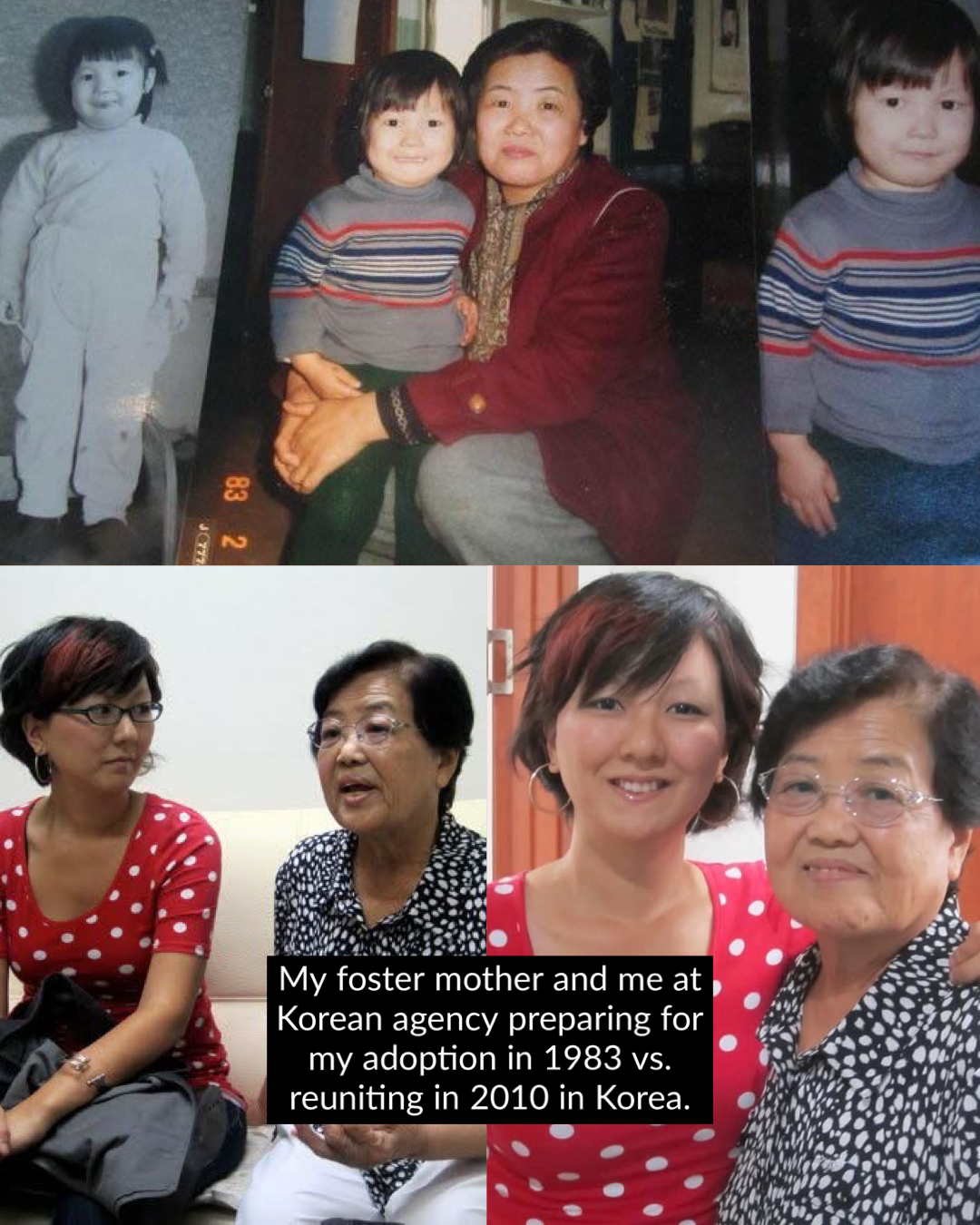What does it mean to be a mother or motherly? Is it just a noun for biological reference, or is it also the act of caring for others, biologically yours or not?
Today is about acknowledging the living moms, but I typically mention those we don’t think of.
*Actually, Mother’s Day was formed in 1870 by mothers who called for anti-war activism and a more just, peaceful society, not the corporate holiday we celebrate today.
This photo is Jason and I visiting my orphanage last year. We are Korean American adoptees. I was abandoned at birth, and my Korean name, ‘Young-eun Kim,’ was given to me by nurses. They named me after the clinic I was born in. I only recently realized they did this so my biological mother could recognize my name if she was ever to search for me in the future.
I’ve tried searching for my biological family a few times with no success. In 2010, I visited my Daegu orphanages and met my foster mom during a second trip back to my birth country. I discovered that after I was born, I was transferred to a convent that took care of orphans post-Korean War. This convent was a temporary resting place until they found the permanent orphanage I lived in for four years. This convent, now a school, is where I met Sister Theresa in 2010. For decades, she has welcomed Korean adoptees from around the world who visit to connect and search for a past they’ve never known.
To many, Sister Theresa is affectionately known as ‘Daegu Umma (mom)’.
Last year, I spent a week in my birth city, Daegu, and revisited my two orphanages, including Sister Theresa, who is such a warm and loving soul. I tell her she has smiling eyes. Sister Theresa lamented her love for children and that it was a shame she couldn’t have kids due to her calling, but that she considered herself a “mother” to the hundreds of adoptees she has met.
In 2010, I reunited with my foster mom. On a train ride from Seoul to Daegu, my caseworker called her on an off chance that she would want to meet me. Surprisingly she robustly claimed me, saying she remembered me, ‘Young-eun’, and had just looked at photos of me days prior, wondering how I was.
When I limped into the room at the Seoul adoption agency, with a cane in my hand and a stylish walking gait, my foster mother, Kyung Sook, got up and cupped my face, recognizing me in a way only a mother could. She remembered me fondly, saying how much I looked the same. She shared that she had fostered kids for over four decades, and when she mothered me, I was the only child she had at the time.
Foster mom shared my personality and moments she remembered, like the day that I approached her, tugging her apron as she cooked, calling her ‘Umma’ for the first time. Umma means mom in Korean. She expressed how happy this moment made her, and that even though I was her shadow, I kept her at arm’s length, so she had been waiting for the day I’d call her mom.
My foster mom also shared our final moment together, when she had to say goodbye to me at the airport. Apparently, I was crying so much that she had to hide so they could take me, but she stayed and watched until my plane was a speck in the sky. She said she cried for a very long time, and my mother told me I cried for months, calling out for my umma (foster mother).
People often view adoption through a romanticized lens and the adoptive parent’s perspective, but rarely do they see it through the child’s eyes, which are filled with trauma, loss, and grief. We, adoptees as children, experience an enormous amount of loss on top of loss on top of loss, some immediately as they enter this world, others aware enough to understand they are being ripped from something they know.
This moment together with my foster mother meant the world to me, like another piece found to my unusual puzzle of life. To know that indeed someone did care for me when I was small and alone, a loneliness that has stayed with me like a committed barnacle, offered some resolve that maybe I wasn’t as unlovable as I had felt.
Mother (noun) 1. a female parent. 2. that which has produced or nurtured anything.
Mother (transitive verb) 1. to adopt as son or daughter; to perform the duties of a mother to. 2. to care for or protect like a mother. 3. maternal tenderness or affection.
What does it mean to be a mother, to mother the lonely and uncared for, no matter the borders between us?
And then there is the “adoptive” mother that is often stamped by society with the misconception that they’re not the “real parents”. People told me this as a kid all the time. Even in my adulthood, I’ve experienced Freudian slips by those who should be the closest to me, as they accidentally share that non-blood isn’t “real” family. If people in your familial circle say things like this, imagine the perception society holds. To me, love and time in between is what family means.
As a kid, the only dream I had was to be a mother. I didn’t even think about marriage, but I thought of my unborn daughter. I could see her face. How strange that every dream I never had has come true, and the one dream I had since childhood never came to fruition.
As I’ve traveled through time, I’ve realized this desire to have children, to see my daughter’s face, was, in part, to see my history in a biology that looked like mine; a DNA code I’ve never been able to crack, and why I’m utterly fascinated by the visual exchange of biology from parent to child. This desire for kids was also probably a form of redemption in which I had a strong desire to show this unborn child how much I loved them, that I’d never leave, and they wouldn’t have to feel as alone as I’ve had to feel through much of my life. I’d always be there, in every way.
Life happened, and in my mid-30s, after living with a rare muscle-wasting condition for over 20 years, I made the difficult decision not to have kids (swipe left for the illustration I drew that sums up this moment).
Having no children isn’t because I biologically couldn’t, though. The more advanced one is, the more pregnancy dramatically progresses the muscle-wasting condition I have, so this was a consideration too.
Not having children was a decision when considering lack of local familial support & resources at the time. There was also the fact that for many years, I had no disabled role models, so I didn’t see disabled parents. The beginnings of my condition were not in a time like today with robust social media that connects disabled people from all corners of the world. I understood the perception society had of someone like me having children, and even received this commentary from those closest to me, which helped feed my internalized ableism. I can’t deny that this also (mis) informed my decision if I could be a good mother or not.
I didn’t begin seeing other disabled people online until my late 30s, and it’s pretty clear that disabled people are more than capable of being parents because the physical doesn’t matter as much as the intangible and being an emotional support for your children.
Another factor that involved my decision not to have kids was the knowledge that I can make a difference, an impact. There is so much I can do which I know would be physically difficult to achieve to the level I envision if I had kids. I’m only speaking for myself, not for others. There are plenty of disabled parents who are also doing amazing advocacy.
It’s funny that I’m putting out a children’s book, but I don’t have any kids. Alas, I don’t have children, but my innate nurturing and advocating side has been put into helping others since I was a kid. While it can be hard on days like this, not having kids doesn’t make me any less of a woman or nurturer.
Maurice Sendak, author and illustrator of ‘Where the Wild Things Are’, had zero children, and yet he helped children ‘survive childhood’. He wasn’t afraid to explore the darker side of childhood, all inspired by an unhappy upbringing. “I refuse to lie to children,” Maurice would say. His work and passion were a form of caregiving.
My path is the one less taken, and I get the honor of living a peculiar and unpredictable life, discovering things about myself I never imagined. While it’s true it’s difficult not having this dream of children come true, it doesn’t stop me from caring my heart out for all people.
To women who desired to be mothers but had to give up their dream, making this day extra difficult. To those entering motherhood & those still waiting. To those who had to abandon their child(ren) or are caught in the trenches of infertility, desperately wanting to become a mother. I know how this feels. To moms struggling to raise children in poverty and the mothers in war-torn regions fiercely protecting their children. To the mothers who had to watch their children, young & old, bombed into nonexistence. For all the trite division & differences among humanity, historically exploited & fear-mongered by power to manufacture annihilation consent, a mother’s love on their knees at the foot of their innocent dead child(ren) killed by man-made destruction needs no translation and is something we should never get used to—armed with unrelenting empathy for the maddening loss of innocent young lives. I am not a mother but need no imagination to recognize the depth of this grief. To foster moms who take on the responsibility of being temporary, loving mothers to the abandoned, orphaned (by war), displaced, confused, and unloved, and then have to give them up. To “adoptive” mothers, you’re just “mom.” To the motherless (like me), whose mothers have passed on. To the mothers who have had to bury their child(ren). To the mom we never got to meet. To those who fear this day as it reminds them of their non-existent relationship with their own mom. To those who mother the furry. Those who mother the sick. To the under-appreciated who give everything, to those with nothing left to give, to mothers in ill health who can’t remember anymore, to the disabled moms who are viewed as inferior and told they shouldn’t have children, to mothers living under abuse, to mommy-in-laws and stepmoms who love & support us, and to the unsung heroes who make it look easy but feel like they’ve lost themselves in the motherhood journey: we couldn’t do life without you. Go easy on yourselves; you’re doing fine, and we’ll be fine. Happy Mother’s Day to all the moms who love so hard. We love you. I miss and love you, mom.






